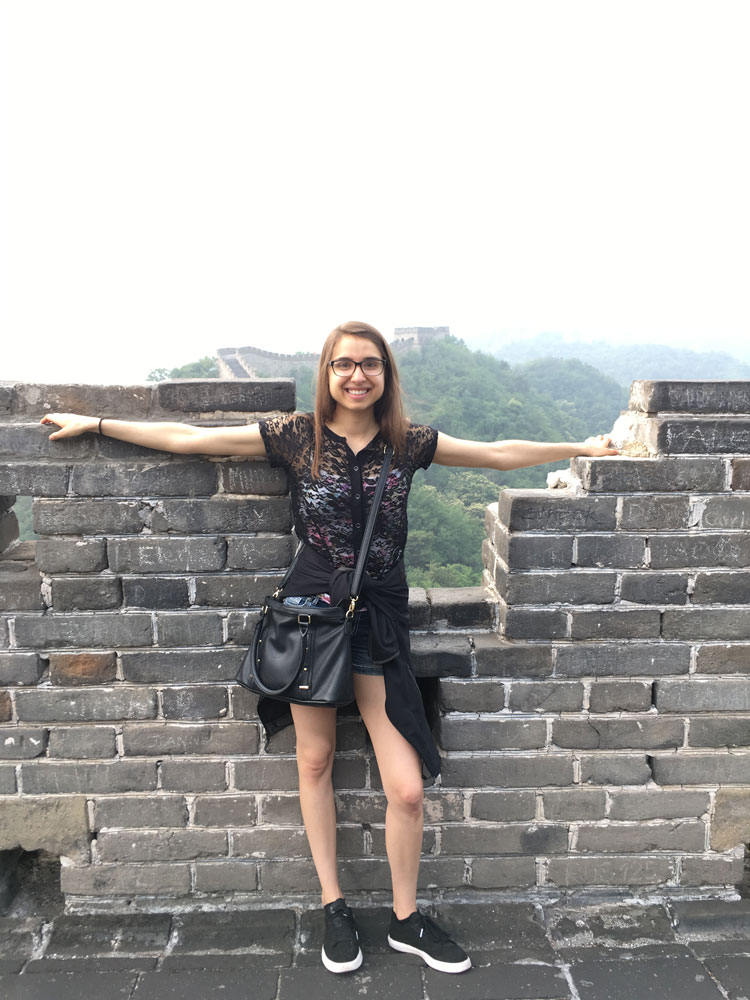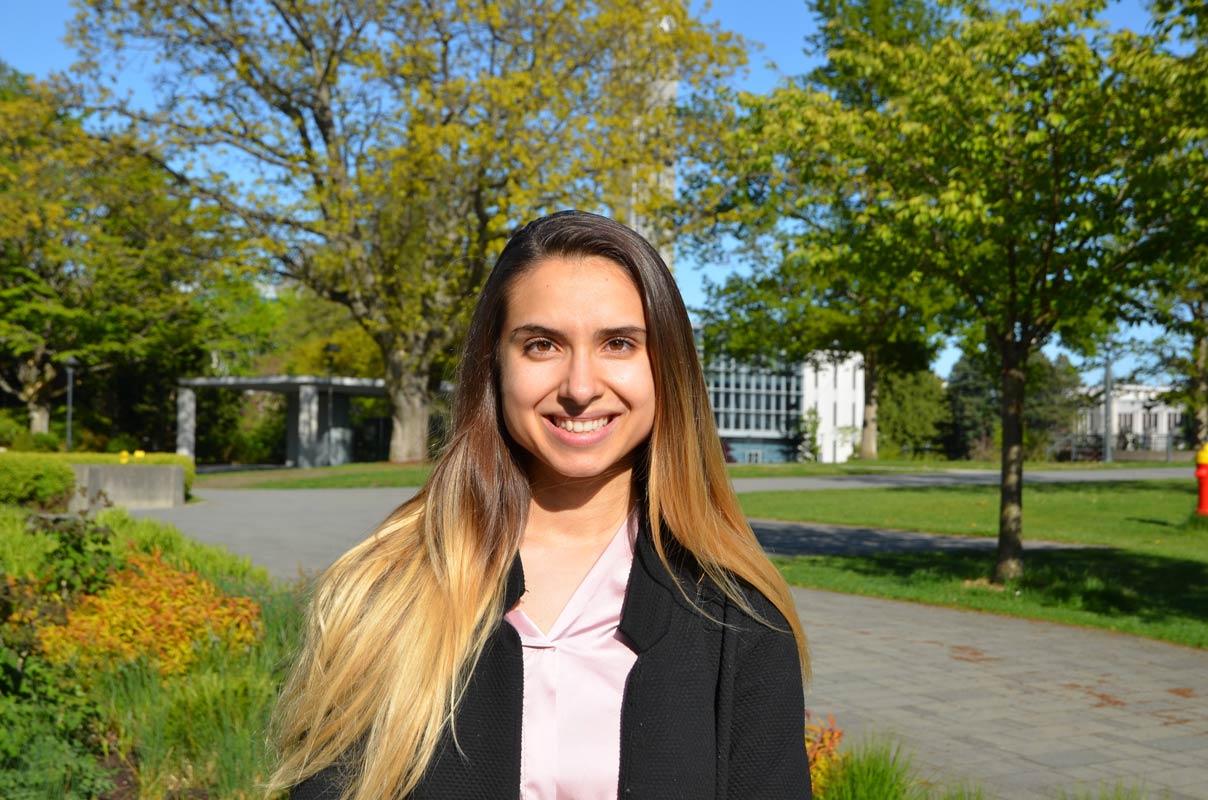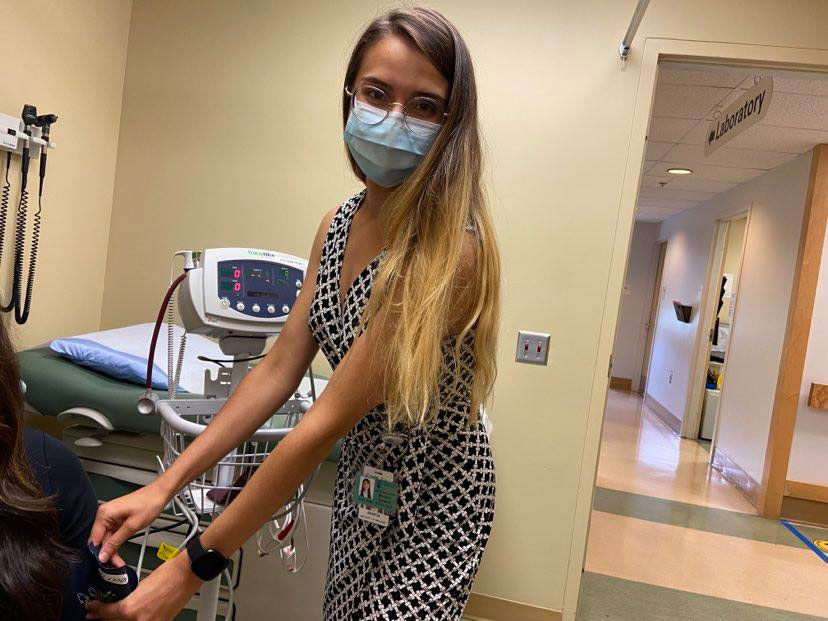Shayda Swann
I believe that Public Scholarship is a social responsibility and that researchers should be ever cognizant about the duty we have to share our work with the people who may be most impacted by it. Public Scholarship should also go beyond knowledge translation to create atmospheres where scientific concepts can be discussed amongst academic and community stakeholders, generating new research foci and opportunities for meaningful partnership.
Research description
My thesis work is focused on studying whether women living with HIV experience hormone abnormalities and if so, whether this contributes to the higher rates of chronic comorbidities that are observed in women living with HIV. I’m particularly interested in looking at reproductive hormones, like estrogen and progesterone, as well as the stress hormone cortisol. I also consider how psychosocial and structural conditions, such as experiences of violence, stigma, and discrimination, may impact women’s hormones and development of comorbidities. Community collaboration is a key component of my work, which includes engaging with women living with HIV at each stage of my research, from study design to knowledge translation.
What does being a Public Scholar mean?
I believe that Public Scholarship is a social responsibility and that researchers should be ever cognizant about the duty we have to share our work with the people who may be most impacted by it. Public Scholarship should also go beyond knowledge translation to create atmospheres where scientific concepts can be discussed amongst academic and community stakeholders, generating new research foci and opportunities for meaningful partnership.
In what ways do you think the PhD experience can be re-imagined with this Initiative?
Often, the primary output of a PhD is the thesis and accompanying manuscript publications. These are undoubtedly important for advancing science, but they are not the only way to share novel and exciting findings. The Public Scholars Initiative offers an opportunity to not only explore creative avenues for knowledge translation, but also ensures that a broader audience benefits from scientific advancements. At the individual level, Public Scholarship also has the potential to reduce burnout and increase connectedness with one’s thesis work, which has most certainly been the case for me. I feel far more motivated to complete a project with the intention to share the results with someone who may be personally affected by it than to publish that work in a journal where I’ll never personally connect with the readership. Lastly, I think this initiative offers an opportunity to re-examine research priorities, with an understanding that scientific discovery can be a bidirectional process of sharing, consulting, and integrating new processes of learning.
How do you envision connecting your PhD work with broader career possibilities?
I’m in the clinician-scientist training program at UBC, which means that I will graduate with both a medical degree and PhD; therefore, my career will likely look like a combination of clinical work and academic research. This aligns well into the ethos of Public Scholarship as my ultimate goal is to conduct research that is relevant to the needs of the patients with whom I’ll work, and then translate research findings back into my approach to clinical care. In this way, I believe Public Scholarship melds well with the “bench-to-bedside” approach of the clinician-scientist.
How does your research engage with the larger community and social partners?
My thesis is embedded within the British Columbia CARMA-CHIWOS Collaboration (BCC3), which takes a cell-to-society approach to understanding healthy aging in women living with HIV. Our research team includes four remarkable women living with HIV who work as Peer Research Associates (PRAs). The PRAs on our team have undergone extensive training into research methods and contribute to discussions around research priorities, engage in data collection, provide input on manuscripts and conference presentations, and present results at both academic and community-facing knowledge translation events. Our study team also meets annually with a Community Advisory Board, consisting of stakeholders who represent the diverse priorities and interests of women living with HIV. I have had the opportunity to work closely with several of these groups to co-host events to share and discuss research findings, such as a “research tea party” and arts-based knowledge translation gatherings.
Why did you decide to pursue a graduate degree?
I decided to transfer into the MD/PhD program half-way through the first year of medical school because I realized how many questions have yet to be explored in medicine. The clinician-scientist training program provides me with a unique opportunity to not only help each individual patient that I might see in the clinic or hospital, but also to potentially better the lives of thousands of patients that I would never meet through my research work. To me, this seems like an ideal win-win situation of being able to provide both individualized patient-centred care while also contributing to the collective goal of scientific advancement.
Why did you choose to come to British Columbia and study at UBC?
I wanted to study at UBC quite simply because I wanted to achieve a world-class education at a stunningly beautiful location. I was also attracted to UBC because of it’s reputation for putting forth ground-breaking HIV research. Vancouver is home to Oak Tree Clinic, the BC Centre for Excellence in HIV/AIDS, and numerous other community and clinical organizations that have changed the way we do HIV research and health care on a global scale. I also wanted to stay close to family and supports that made staying Vancouver all the more special.
What is it specifically that your program offers that attracted you?
The timeline of the MD/PhD program at UBC was very attractive to me. Most graduate programs can take up to 7 years, whereas with this program I’m able to complete both a medical degree and PhD in that same time span. The program here at UBC also offers tons of supports for students, including a monthly seminar series, annual meetings with the program director, and support for obtaining external funding. Our program also boasts quite an impressive track-record for prestigious awards, like Vanier and CGS-D, and graduates from this program are highly successful in achieving both their research and career goals. I also appreciated that the program gave me a great deal of flexibility in choosing a project that was most aligned with my research interests.
For you, what was the best surprise about graduate life, about UBC or life in Vancouver?
I love that I can walk five minutes in one direction and be at the ocean, or walk ten minutes in the other direction and be in the forest. It's also a short drive to downtown for a taste of the city or a hike in the mountains.
What aspect of your graduate program do you enjoy the most or are looking forward to with the greatest curiosity?
What I enjoy most is the opportunity to work with and learn from leaders in the community. For example, my research team includes two Indigenous Elders and four women living with HIV who work on our study as peer research associates. It has been such an immense honor to learn from and work with these incredible women. On a similar thread, I am looking forward to working with our community team members to breaking down the misconception that basic and clinical science can't also be community-based.
What do you see as your biggest challenge(s) in your future career?
Unfortunately, I'm well aware that as a women in science I am less likely to receive competitive funding or high level academic positions compared to my male colleagues (Status of Women Committee. Achieving Pay Equity for UBC Faculty Women. Vancouver; 2011). I hope that we continue to address systems of injustice that prevent women from achieving their highest potentials in this field. I also know that balancing both clinical and research demands as a clinician-scientist can be incredibly challenging. However, I'm very fortunate to have my supervisor as an example of someone who can wear these two hats and still thrive in this field.
How do you feel your program is preparing you for those challenges?
Our program puts on a fantastic monthly seminar series where we are able to hear about the experiences of successful clinician-scientists and how they are able to navigate these equally demanding roles. It's always very inspiring to hear the different and creative ways that people balance their clinical and research practices. The MD/PhD program also encourages mentorship between current students and alumni, which allows students to discuss current challenges in the program and see how others have built a successful career.
What aspects of your life or career before now have best prepared you for your UBC graduate program?
I was raised in the Baha'i faith, which places a very strong emphasis on the education of all children, especially women and girls. Currently, Baha'is in Iran, where my family is from, are systematically barred from pursuing any form of higher education. This has given me an even deeper appreciation of my own freedom to go to graduate school without fear of persecution and has galvanized my passion for learning. I am also very fortunate to be raised by parents who have given me endless support for my educational goals and continue to inspire me every day.
What do you like to do for fun or relaxation?
I dance every day, both for fun and also out of compulsion. When the weather is nice, I love getting outdoor and being active, like running or cycling. To relax, I enjoy cuddling up on the couch with a good book and my sweet little blind cat Fergie.
What advice do you have for new graduate students?
Take all the time you have to find a great supervisor. I spoke to several potential supervisors before choosing to work with Dr. Murray and Dr. Cote, and I couldn't be more grateful for my pickiness. Taking the time to find a supervisor who not only supports your research work, but also cares about your development as a young scientist is incredibly important and has made all the difference in my own training. I would argue that a good supervisor is even more important than an interesting project.







